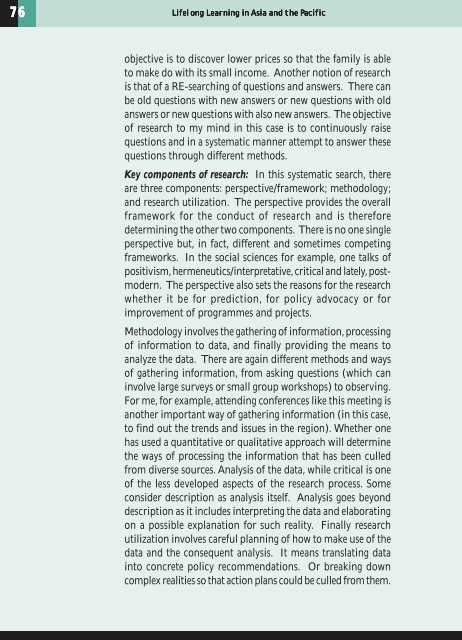Lifelong Learning in Asia and the Pacific
Lifelong Learning in Asia and the Pacific
Lifelong Learning in Asia and the Pacific
You also want an ePaper? Increase the reach of your titles
YUMPU automatically turns print PDFs into web optimized ePapers that Google loves.
76<br />
76 Lifelo<br />
long <strong>Learn<strong>in</strong>g</strong> <strong>in</strong> <strong>Asia</strong> <strong>and</strong> <strong>the</strong> <strong>Pacific</strong><br />
objective is to discover lower prices so that <strong>the</strong> family is able<br />
to make do with its small <strong>in</strong>come. Ano<strong>the</strong>r notion of research<br />
is that of a RE-search<strong>in</strong>g of questions <strong>and</strong> answers. There can<br />
be old questions with new answers or new questions with old<br />
answers or new questions with also new answers. The objective<br />
of research to my m<strong>in</strong>d <strong>in</strong> this case is to cont<strong>in</strong>uously raise<br />
questions <strong>and</strong> <strong>in</strong> a systematic manner attempt to answer <strong>the</strong>se<br />
questions through different methods.<br />
Key components of research: In this systematic search, <strong>the</strong>re<br />
are three components: perspective/framework; methodology;<br />
<strong>and</strong> research utilization. The perspective provides <strong>the</strong> overall<br />
framework for <strong>the</strong> conduct of research <strong>and</strong> is <strong>the</strong>refore<br />
determ<strong>in</strong><strong>in</strong>g <strong>the</strong> o<strong>the</strong>r two components. There is no one s<strong>in</strong>gle<br />
perspective but, <strong>in</strong> fact, different <strong>and</strong> sometimes compet<strong>in</strong>g<br />
frameworks. In <strong>the</strong> social sciences for example, one talks of<br />
positivism, hermeneutics/<strong>in</strong>terpretative, critical <strong>and</strong> lately, postmodern.<br />
The perspective also sets <strong>the</strong> reasons for <strong>the</strong> research<br />
whe<strong>the</strong>r it be for prediction, for policy advocacy or for<br />
improvement of programmes <strong>and</strong> projects.<br />
Methodology <strong>in</strong>volves <strong>the</strong> ga<strong>the</strong>r<strong>in</strong>g of <strong>in</strong>formation, process<strong>in</strong>g<br />
of <strong>in</strong>formation to data, <strong>and</strong> f<strong>in</strong>ally provid<strong>in</strong>g <strong>the</strong> means to<br />
analyze <strong>the</strong> data. There are aga<strong>in</strong> different methods <strong>and</strong> ways<br />
of ga<strong>the</strong>r<strong>in</strong>g <strong>in</strong>formation, from ask<strong>in</strong>g questions (which can<br />
<strong>in</strong>volve large surveys or small group workshops) to observ<strong>in</strong>g.<br />
For me, for example, attend<strong>in</strong>g conferences like this meet<strong>in</strong>g is<br />
ano<strong>the</strong>r important way of ga<strong>the</strong>r<strong>in</strong>g <strong>in</strong>formation (<strong>in</strong> this case,<br />
to f<strong>in</strong>d out <strong>the</strong> trends <strong>and</strong> issues <strong>in</strong> <strong>the</strong> region). Whe<strong>the</strong>r one<br />
has used a quantitative or qualitative approach will determ<strong>in</strong>e<br />
<strong>the</strong> ways of process<strong>in</strong>g <strong>the</strong> <strong>in</strong>formation that has been culled<br />
from diverse sources. Analysis of <strong>the</strong> data, while critical is one<br />
of <strong>the</strong> less developed aspects of <strong>the</strong> research process. Some<br />
consider description as analysis itself. Analysis goes beyond<br />
description as it <strong>in</strong>cludes <strong>in</strong>terpret<strong>in</strong>g <strong>the</strong> data <strong>and</strong> elaborat<strong>in</strong>g<br />
on a possible explanation for such reality. F<strong>in</strong>ally research<br />
utilization <strong>in</strong>volves careful plann<strong>in</strong>g of how to make use of <strong>the</strong><br />
data <strong>and</strong> <strong>the</strong> consequent analysis. It means translat<strong>in</strong>g data<br />
<strong>in</strong>to concrete policy recommendations. Or break<strong>in</strong>g down<br />
complex realities so that action plans could be culled from <strong>the</strong>m.

















